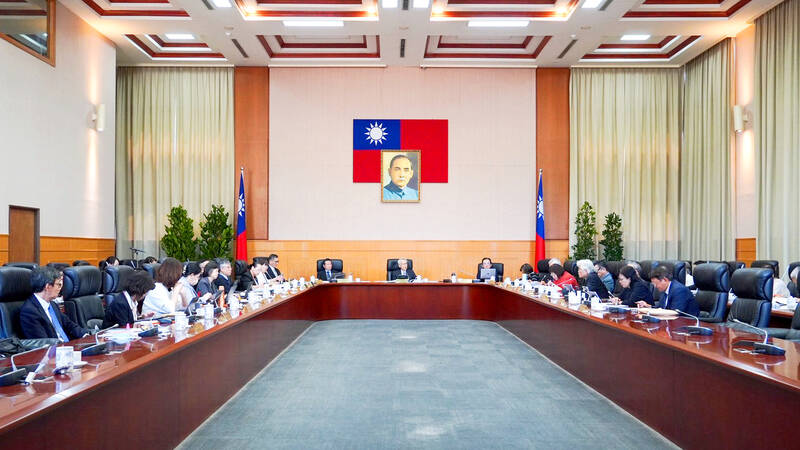The Examination Yuan yesterday said a new policy giving civil servants three days of flexible mental health leave would start on Oct. 10.
The Examination Yuan last month approved an amendment to the Regulations on Civil Servants’ Leave Days (公務人員請假規則), which added mental health days, and revamped the system for civil servants’ days off and procedures for application.
Only the part of the amendment covering mental health days is to take effect on Oct. 10, in observance of World Mental Health Day, the Examination Yuan said, adding that the rest the amendment is to be implemented on Jan. 1 next year.

Photo courtesy of the Examination Yuan
The mental health days aim to encourage civil servants to take days off to ensure their psychological and physical well-being, the Examination Yuan said in a statement.
The leave could be taken on an hourly basis and would be considered a form of personal leave, it added.
No documentation is required to take a mental wellness leave, and the application cannot be refused, it said, adding that no punishments can be implemented for taking such leave.
The amendment also states that civil servants should have no less than three days of leave per year, to ensure that people just starting their careers would also have guaranteed rest and recreation time, it said.
Regulations would be relaxed to ease the entry and exit of people from government jobs, it added.
The leave of civil servants quitting their jobs, those who get a different public job, personnel outside of state-owned industries, contracted civil servants, educators at state-funded schools and volunteer soldiers who become civil servants would be in accordance with the days off at their new job if their previous employment days did not segue smoothly into their new job, it said.
Meanwhile, restrictions for unpaid leave to take care of children or grandchildren younger than three would be relaxed, the amendment showed.
Leave would be based on the person’s length of tenure and associated benefits, in terms of off days or wages, it added.
Unpaid maternity leave should not count toward employees’ annual leave and number of personal leave days, it said.
The amendment also introduced a clause stating that civil servants must use their annual and compensatory leave before they take personal leave, which is subject to wage deductions.
The clause aims to address civil servants exploiting loopholes in the law by taking long periods of personal leave, as there are no limits on the number of such days off people can take, the Examination Yuan said.
Additional reporting by CNA

TRAFFIC SAFETY RULES: A positive result in a drug test would result in a two-year license suspension for the driver and vehicle, and a fine of up to NT$180,000 The Ministry of Transportation and Communications is to authorize police to conduct roadside saliva tests by the end of the year to deter people from driving while under the influence of narcotics, it said yesterday. The ministry last month unveiled a draft of amended regulations governing traffic safety rules and penalties, which included provisions empowering police to conduct mandatory saliva tests on drivers. While currently rules authorize police to use oral fluid testing kits for signs of drug use, they do not establish penalties for noncompliance or operating procedures for officers to follow, the ministry said. The proposed changes to the regulations require

The Executive Yuan yesterday announced that registration for a one-time universal NT$10,000 cash handout to help people in Taiwan survive US tariffs and inflation would start on Nov. 5, with payouts available as early as Nov. 12. Who is eligible for the handout? Registered Taiwanese nationals are eligible, including those born in Taiwan before April 30 next year with a birth certificate. Non-registered nationals with residence permits, foreign permanent residents and foreign spouses of Taiwanese citizens with residence permits also qualify for the handouts. For people who meet the eligibility requirements, but passed away between yesterday and April 30 next year, surviving family members

China Airlines Ltd (CAL) yesterday morning joined SkyTeam’s Aviation Challenge for the fourth time, operating a demonstration flight for “net zero carbon emissions” from Taiwan Taoyuan International Airport to Bangkok. The flight used sustainable aviation fuel (SAF) at a ratio of up to 40 percent, the highest proportion CAL has achieved to date, the nation’s largest carrier said. Since April, SAF has become available to Taiwanese international carriers at Taipei International Airport (Songshan airport), Kaohsiung International Airport and Taoyuan airport. In previous challenges, CAL operated “net zero carbon emission flights” to Singapore and Japan. At a ceremony at Taoyuan airport, China Airlines chief sustainability

‘ONE CHINA’: A statement that Berlin decides its own China policy did not seem to sit well with Beijing, which offered only one meeting with the German official German Minister for Foreign Affairs Johann Wadephul’s trip to China has been canceled, a spokesperson for his ministry said yesterday, amid rising tensions between the two nations, including over Taiwan. Wadephul had planned to address Chinese curbs on rare earths during his visit, but his comments about Berlin deciding on the “design” of its “one China” policy ahead of the trip appear to have rankled China. Asked about Wadephul’s comments, Chinese Ministry of Foreign Affairs spokesman Guo Jiakun (郭嘉昆) said the “one China principle” has “no room for any self-definition.” In the interview published on Thursday, Wadephul said he would urge China to